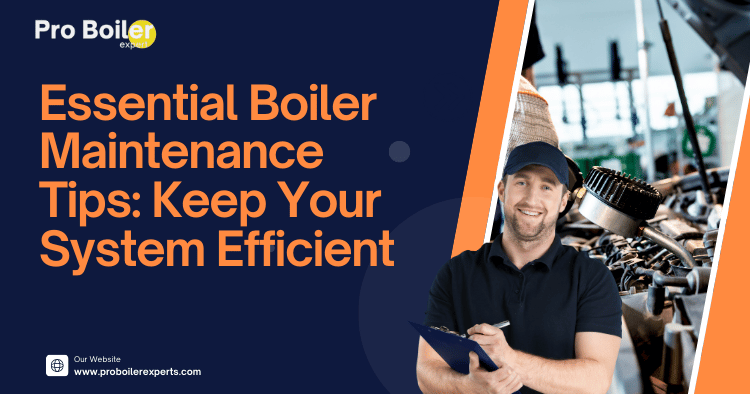Table of Contents
- Understanding Your Boiler System
- Regular Inspections
- Cleaning and Descaling
- Checking the Pressure
- Thermostat Calibration
- Flue and Vent Inspection
- Hiring a Professional
- FAQs
- Conclusion
Understanding Your Boiler System
To maintain your boiler effectively, it’s crucial to understand its components and how they work together. A boiler heats water to provide hot water or steam for heating systems. There are various types of boilers, including gas, oil, and electric, each with unique maintenance requirements. Familiarize yourself with your boiler’s manual, which outlines specific maintenance tasks and schedules.
Key Components:
- Burner: Responsible for heating the water.
- Heat Exchanger: Transfers heat from the burner to the water.
- Pump: Circulates hot water.
- Controls: Regulate temperature and pressure.
For a deeper understanding, check out this guide from the U.S. Department of Energy.
Regular Inspections
Regular inspections are vital for ensuring your boiler operates efficiently and safely. A comprehensive inspection should be conducted at least once a year. This includes checking all components for wear and tear, ensuring safety features are functional, and looking for signs of leaks or corrosion.
What to Inspect:
- Pressure Relief Valve: This is crucial for safety. It should open and close without sticking.
- Burner Assembly: Inspect for dust and dirt that can hinder performance.
- Heat Exchanger: Check for blockages or scaling that can affect heat transfer.
Benefits of Regular Inspections:
- Efficiency: Ensures your boiler runs at optimal performance.
- Safety: Identifies potential hazards before they become serious issues.
- Longevity: Regular maintenance can extend the life of your boiler.
For more insights on maintaining various boiler types, refer to articles like Top 5 Benefits of Choosing Combi Boilers for Your Home and Top 5 Benefits of Choosing a System Boiler for Your Home.
Cleaning and Descaling
Over time, debris and minerals can accumulate in your boiler, affecting its efficiency. Cleaning and descaling are essential to maintain performance.
How to Clean:
- Shut Down the System: Always turn off the boiler and let it cool.
- Remove Debris: Use a soft brush to remove dust and dirt from burners and other components.
- Descale: For hard water deposits, use a commercial descaling solution. Follow the manufacturer’s instructions closely.
Visual Example:
| Type of Boiler | Cleaning Frequency |
|---|---|
| Gas | Annually |
| Oil | Every 6 months |
| Electric | Annually |
For more detailed cleaning instructions, visit Energy Star’s boiler maintenance page.
Checking the Pressure
Maintaining the correct pressure in your boiler is crucial for its efficiency and safety. The ideal pressure typically falls between 1-2 bar when the system is cold.
How to Check:
- Locate the Pressure Gauge: Usually found on the front of the boiler.
- Monitor Regularly: Check the pressure weekly to ensure it remains within the recommended range.
- Adjust Pressure: If the pressure is too high or low, consult your manual for instructions on how to adjust it or call a professional.
Common Pressure Issues:
- Low Pressure: Can result in inadequate heating.
- High Pressure: Can lead to leaks or even explosions.
Regular monitoring can save you from costly repairs down the line—keep a close eye on that gauge!
Thermostat Calibration
Your boiler’s thermostat plays a pivotal role in maintaining the desired temperature in your home. Regular calibration ensures that your boiler runs efficiently and reduces energy costs.
Steps to Calibrate:
- Check the Current Settings: Ensure the thermostat is set to the desired temperature.
- Test the Thermostat: Use a separate thermometer to compare temperatures. If there’s a discrepancy, recalibrate.
- Replace Batteries: If it’s a battery-operated thermostat, ensure the batteries are fresh.
Benefits of Calibration:
- Energy Savings: A properly calibrated thermostat can reduce energy consumption.
- Comfort: Ensures consistent heating throughout your home.
Proper thermostat calibration not only enhances comfort but can also lead to significant savings on your energy bills!
Flue and Vent Inspection
The flue and vents are vital for safely expelling combustion gases from your boiler. Regularly inspect these components to prevent dangerous situations.
Inspection Checklist:
- Check for Blockages: Ensure no debris or nests are obstructing the flue.
- Inspect Seals: Look for cracks or gaps that could leak harmful gases.
- Test for Carbon Monoxide: Consider installing a carbon monoxide detector in your home for added safety.
Safety Precautions:
Always hire a professional for a thorough inspection if you suspect any issues with your flue or venting system.
Safety first! Never overlook the importance of a properly functioning flue and vent system.
Hiring a Professional
While some maintenance tasks can be done by homeowners, hiring a professional for more complex maintenance is wise. Professionals have the training and tools to service your boiler safely and effectively.
When to Call a Professional:
- Annual Inspections: A comprehensive check should always be performed by a certified technician.
- Repairs: If you notice unusual noises, leaks, or performance issues.
- Upgrades: When considering a more efficient boiler system, such as hybrid boilers or smart boilers.
Finding a Qualified Technician:
Check the National Board of Boiler and Pressure Vessel Inspectors for certified professionals in your area.
Don’t underestimate the value of professional expertise—investing in a good technician can save you time and money in the long run!
FAQs
Q: How often should I perform boiler maintenance?
A: At a minimum, perform maintenance annually. However, some components may need more frequent checks.
Q: What are the signs my boiler needs maintenance?
A: Look for unusual noises, inconsistent heating, water leaks, or a drop in pressure.
Q: Can I perform boiler maintenance myself?
A: Basic tasks like checking the pressure and cleaning can be done by homeowners. However, complex tasks should be handled by professionals.
Remember, when in doubt, it’s always safer to call in a pro!
Conclusion
Regular boiler maintenance is crucial for safety, efficiency, and longevity. By following these essential tips, you can ensure that your boiler operates at optimal performance while reducing energy costs and preventing costly repairs. Remember, when in doubt, consult a professional. Your boiler will thank you, and so will your wallet!
For further reading, consider exploring resources on different types of boilers, such as Top 5 Benefits of Biomass Boilers for Eco-Friendly Heating and Top 5 Electric Boilers for Efficient Home Heating in 2024.





